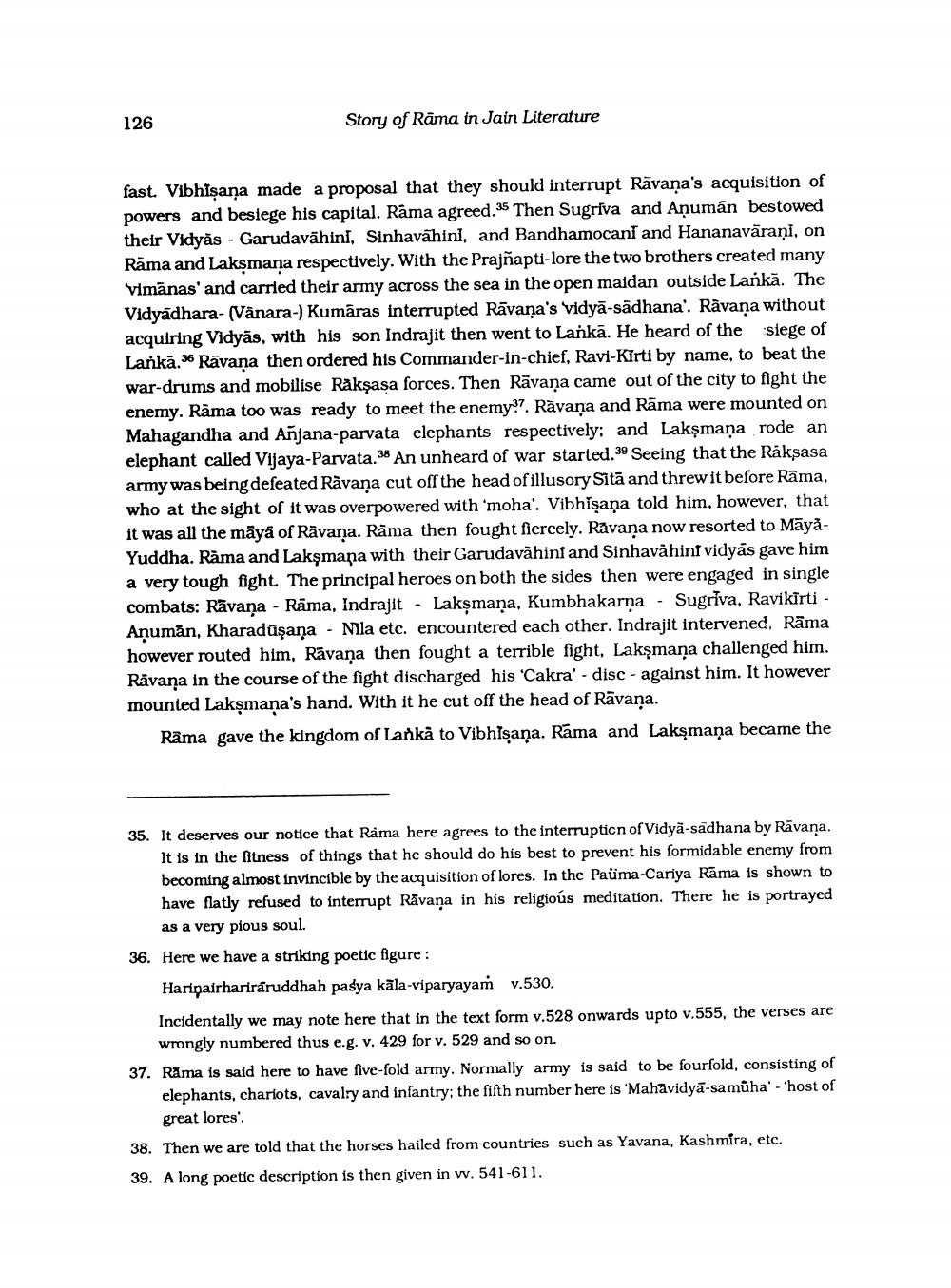________________
126
Story of Rāma in Jain Literature
fast. Vibhisana made a proposal that they should interrupt Rāvana's acquisition of powers and besiege his capital. Rama agreed. 35 Then Sugriva and Anuman bestowed their Vidyas - Garudavähini, Sinhavähini, and Bandhamocani and Hananavāraņi, on Rama and Lakşmana respectively. With the Prajñapti-lore the two brothers created many vimānas' and carried their army across the sea in the open maidan outside Lankā. The Vidyadhara- (Vänara-) Kumāras interrupted Rāvana's vidyā-sadhana'. Rāvana without acquiring Vidyās, with his son Indrajit then went to Lankā. He heard of the siege of Lankā. Ravana then ordered his Commander-in-chief, Ravi-Kirti by name, to beat the war-drums and mobilise Raksasa forces. Then Rävaņa came out of the city to fight the enemy. Rama too was ready to meet the enemy?7. Rāvana and Rāma were mounted on Mahagandha and Anjana-parvata elephants respectively; and Lakşmaņa rode an elephant called Vijaya-Parvata.38 An unheard of war started. 39 Seeing that the Raksasa army was being defeated Ràvana cut off the head of illusory Sitā and threw it before Rāma, who at the sight of it was overpowered with 'moha'. Vibhîşaņa told him, however, that it was all the māyā of Rāvana. Rāma then fought fiercely. Ravana now resorted to MāyåYuddha. Rama and Lakşmapa with their Garudavāhini and Sinhavähini vidyas gave him a very tough fight. The principal heroes on both the sides then were engaged in single combats: Ravana - Rāma, Indrajit - Lakşmaņa, Kumbhakarna - Sugrīva, Ravikīrti - Anuman, Kharadūşana - Nila etc. encountered each other. Indrajit intervened. Rāma however routed him, Rāvana then fought a terrible fight, Lakşmana challenged him. Råvana in the course of the fight discharged his 'Cakra'- disc - against him. It however mounted Lakşmana's hand. With it he cut off the head of Rāvana.
Rāma gave the kingdom of Lanka to Vibhisaņa. Rama and Lakşmaņa became the
35. It deserves our notice that Rama here agrees to the interrupticn of Vidya-sadhana by Rāvana.
It is in the fitness of things that he should do his best to prevent his formidable enemy from becoming almost invincible by the acquisition of lores. In the Paüma-Cariya Rāma is shown to have flatly refused to interrupt Råvana in his religious meditation. There he is portrayed
as a very pious soul. 36. Here we have a striking poetic figure :
Harimairhariraruddhah pasya kāla-viparyayam v.530. Incidentally we may note here that in the text form v.528 onwards upto v.555, the verses are
wrongly numbered thus e.g. v. 429 for v. 529 and so on. 37. Rama is said here to have five-fold army. Normally army is said to be fourfold, consisting of
elephants, chariots, cavalry and infantry: the fifth number here is 'Mahavidyā-samüha' - 'host of
great lores' 38. Then we are told that the horses hailed from countries such as Yavana, Kashmira, etc. 39. A long poetic description is then given in w. 541-611.




